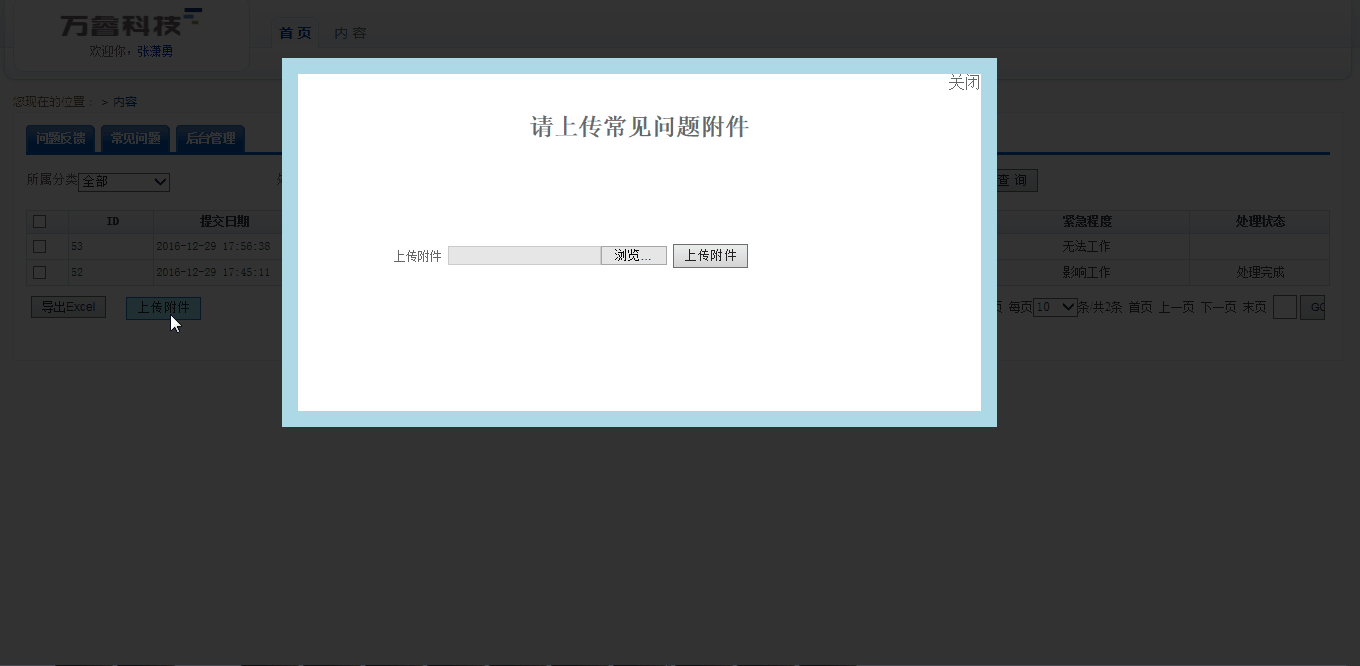前言
近日项目中做到一个功能,需要上传附件后能够在线预览。之前也没做过这类似的,于是乎就查找了相关资料,.net实现Office文件预览大概有这几种方式:
① 使用Microsoft的Office组件将文件直接转换为html文件(优点:代码实现最简单,工作强度最小。缺点:效果极差)
②使用Microsoft的Office组件将文件转换为PDF格式文件,然后再使用pdf2swf转换为swf文件,也就是flash文件在使用FlexPaper展示出来(优点:预览效果能接受,缺点:代码量大)
③使用Office online(优点:表现完美,缺点:不适合中小企业应用)
由于开发时间短而且还有其他功能点需要完成,所以暂时先已第一种方式实现了,这里也主要讲第一种方式,效果如下图:

具体实现
这里简单提一下效果图中的遮罩效果和上传实现,有喜欢的朋友也可以参考参考。
遮罩效果就是HTML+CSS+JS来实现的,全部代码如下:

<!DOCTYPE html PUBLIC "-//W3C//DTD XHTML 1.0 Transitional//EN" "http://www.w3.org/TR/xhtml1/DTD/xhtml1-transitional.dtd"> <html xmlns="http://www.w3.org/1999/xhtml"> <head> <title>弹出层</title> <script src="jquery-1.6.2.min.js" type="text/javascript"></script> <style> .black_overlay{ display: none; position: absolute; top: 0%; left: 0%; width: 100%; height: 100%; background-color: black; z-index:1001; -moz-opacity: 0.8; opacity:.80; filter: alpha(opacity=80); } .white_content { display: none; position: absolute; top: 10%; left: 10%; width: 80%; height: 80%; border: 16px solid lightblue; background-color: white; z-index:1002; overflow: auto; } .white_content_small { display: none; position: absolute; top: 20%; left: 30%; width: 40%; height: 50%; border: 16px solid lightblue; background-color: white; z-index:1002; overflow: auto; } </style> <script type="text/javascript"> //弹出隐藏层 function ShowDiv(show_div,bg_div){ document.getElementById(show_div).style.display='block'; document.getElementById(bg_div).style.display='block' ; var bgdiv = document.getElementById(bg_div); bgdiv.style.width = document.body.scrollWidth; // bgdiv.style.height = $(document).height(); $("#"+bg_div).height($(document).height()); }; //关闭弹出层 function CloseDiv(show_div,bg_div) { document.getElementById(show_div).style.display='none'; document.getElementById(bg_div).style.display='none'; }; </script> </head> <body> <input id="Button1" type="button" value="点击弹出层" onclick="ShowDiv('MyDiv','fade')" /> <!--弹出层时背景层DIV--> <div id="fade" class="black_overlay"> </div> <div id="MyDiv" class="white_content"> <div style="text-align: right; cursor: default; height: 40px;"> <span style="font-size: 16px;" onclick="CloseDiv('MyDiv','fade')">关闭</span> </div> 目前来说,我还是喜欢这个自己改造的弹出层。自己在项目中也用的是这个。 </div> </body> </html>
上传的话,因为文件比较小,所以采用的是保存在服务器,在数据库中存放路径的方式
前台代码
<div class="white_content" id="MyDiv" style="text-align: center; display: none;"> <div style="text-align: right; cursor: default; height: 40px;"> <span style="font-size: 16px;" onclick="CloseDiv('MyDiv','fade')">关闭</span> </div> <tr style=" 50%" id="upload_Image"> <h1> 请上传常见问题附件</h1> <td align="right" class="Title"> 上传附件 </td> <td> <asp:FileUpload ID="FileUpload1" runat="server" /> <asp:Label ID="label1" runat="server" ForeColor="Red"></asp:Label> <asp:Button ID="UploadButton" runat="server" Text="上传附件" OnClick="UploadButton_Click" /> </td> </tr> <tr> <td colspan="2" align="center" id="show_image" style="visibility: hidden"> <asp:Image ID="Image1" runat="server" Height="118px" Width="131px" /> </td> </tr> </div>
后台方法
try { string FullName = FileUpload1.PostedFile.FileName;//获取附件物理地址 FileInfo fi = new FileInfo(FullName); string name = fi.Name;//获取附件名称 string type = fi.Extension;//获取附件类型 if (type == ".xls" || type == ".xlsx" || type == ".doc" || type == ".docx" || type == ".pdf") { string SavePath = Server.MapPath("~\uploadFile");//附件保存到文件夹下 if (!Directory.Exists(SavePath)) { Directory.CreateDirectory(SavePath); } this.FileUpload1.PostedFile.SaveAs(SavePath + "\" + name);//保存路径 #region 将附件内容保存到数据库中 int showsuccess = CMSModelManager.Submitted_questionsDAO.Save_File(name,type,SavePath); if (showsuccess == 1) { this.label1.Text = "上传成功"; } else { this.label1.Text = "服务器繁忙,请稍后重试"; } #endregion } else { this.label1.Text = "请选择正确的格式附件"; } } catch (Exception ex) { Response.Write(ex.Message); }
图中所示的将Word转换成HTML的实现方式:
首先新建一个帮助类

using System; using System.Collections.Generic; using System.Web; //using Microsoft.Office.Core; using Word = Microsoft.Office.Interop.Word; namespace Com.VanruPortal.Admin { public class Office2HtmlHelper { /// <summary> /// Word转成Html /// </summary> /// <param name="path">要转换的文档的路径</param> /// <param name="savePath">转换成html的保存路径</param> /// <param name="wordFileName">转换成html的文件名字</param> public static void Word2Html(string path, string savePath, string wordFileName) { Word.ApplicationClass word = new Word.ApplicationClass(); Type wordType = word.GetType(); Word.Documents docs = word.Documents; Type docsType = docs.GetType(); Word.Document doc = (Word.Document)docsType.InvokeMember("Open", System.Reflection.BindingFlags.InvokeMethod, null, docs, new Object[] { (object)path, true, true }); Type docType = doc.GetType(); string strSaveFileName = savePath + wordFileName + ".html"; object saveFileName = (object)strSaveFileName; docType.InvokeMember("SaveAs", System.Reflection.BindingFlags.InvokeMethod, null, doc, new object[] { saveFileName, Word.WdSaveFormat.wdFormatFilteredHTML }); docType.InvokeMember("Close", System.Reflection.BindingFlags.InvokeMethod, null, doc, null); wordType.InvokeMember("Quit", System.Reflection.BindingFlags.InvokeMethod, null, word, null); } /// <summary> /// Excel转成Html /// </summary> /// <param name="path">要转换的文档的路径</param> /// <param name="savePath">转换成html的保存路径</param> /// <param name="wordFileName">转换成html的文件名字</param> public static void Excel2Html(string path, string savePath, string wordFileName) { string str = string.Empty; Microsoft.Office.Interop.Excel.Application repExcel = new Microsoft.Office.Interop.Excel.Application(); Microsoft.Office.Interop.Excel.Workbook workbook = null; Microsoft.Office.Interop.Excel.Worksheet worksheet = null; workbook = repExcel.Application.Workbooks.Open(path, Type.Missing, Type.Missing, Type.Missing, Type.Missing, Type.Missing, Type.Missing, Type.Missing, Type.Missing, Type.Missing, Type.Missing, Type.Missing, Type.Missing, Type.Missing, Type.Missing); worksheet = (Microsoft.Office.Interop.Excel.Worksheet)workbook.Worksheets[1]; object htmlFile = savePath + wordFileName + ".html"; object ofmt = Microsoft.Office.Interop.Excel.XlFileFormat.xlHtml; workbook.SaveAs(htmlFile, ofmt, Type.Missing, Type.Missing, Type.Missing, Type.Missing, Microsoft.Office.Interop.Excel.XlSaveAsAccessMode.xlNoChange, Type.Missing, Type.Missing, Type.Missing, Type.Missing, Type.Missing); object osave = false; workbook.Close(osave, Type.Missing, Type.Missing); repExcel.Quit(); } } }
后台调用方法
#region 上传成功后将文件转换 string physicalPath = Server.MapPath(Server.UrlDecode("/uploadFile"+"\"+ name));//读取相对路径 string extension = Path.GetExtension(physicalPath);//获取后缀名 string[] show_name = name.Split(new string[] { "." }, StringSplitOptions.RemoveEmptyEntries);//此处的name是上面上传附件中的名称分割 string show_name_View = show_name[0];//拿到实际name switch (extension) { case ".doc": case ".docx": Office2HtmlHelper.Word2Html(MapPath("/uploadFile" + "\" + name + ""), MapPath("/Html/"), "" + show_name_View + "");//调用帮助类中生成WordHtml的方法,并保存起来 Response.Write("<script>window.open('/Html/" + show_name_View + ".html','_blank')</script>");//跳转并打开保存的相对路径中hmtl文件 break; case ".xls": case ".xlsx": Office2HtmlHelper.Excel2Html(MapPath("/uploadFile" + "\" + name + ""), MapPath("/Html/"), "" + show_name_View + ""); Response.Write("<script>window.open('/Html/" + show_name_View + ".html','_blank')</script>"); break; default: break; } #endregion
至此,一个简易的上传附件在线浏览已经全部实现
如果小伙伴有更好得实现方式或者其他建议,欢迎留言告知~
